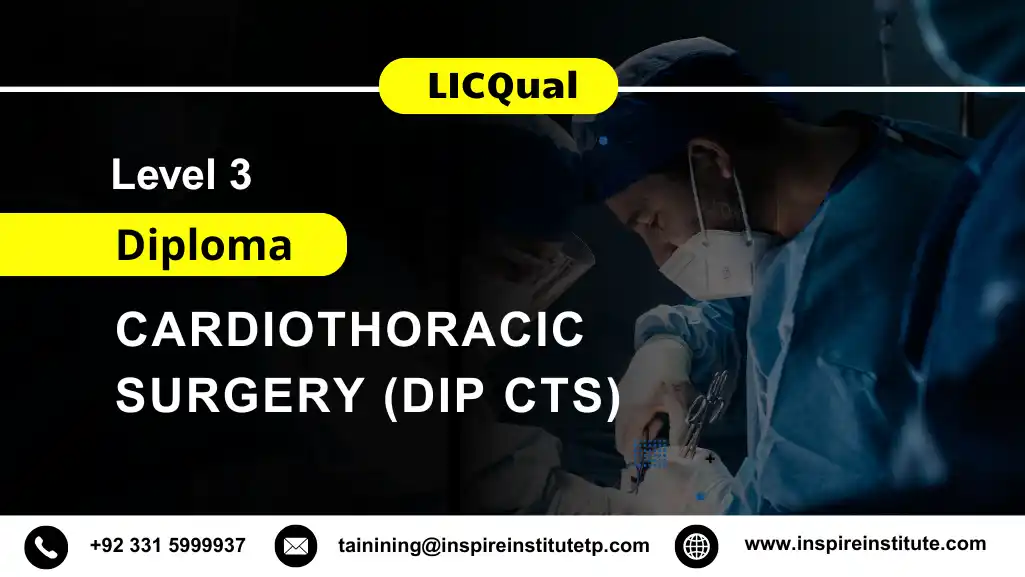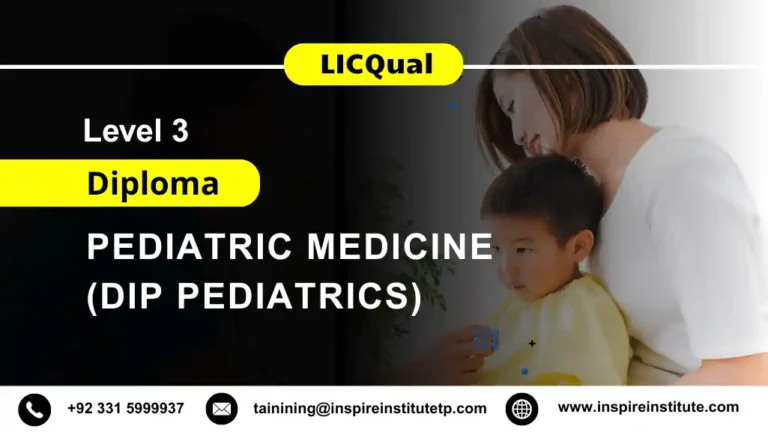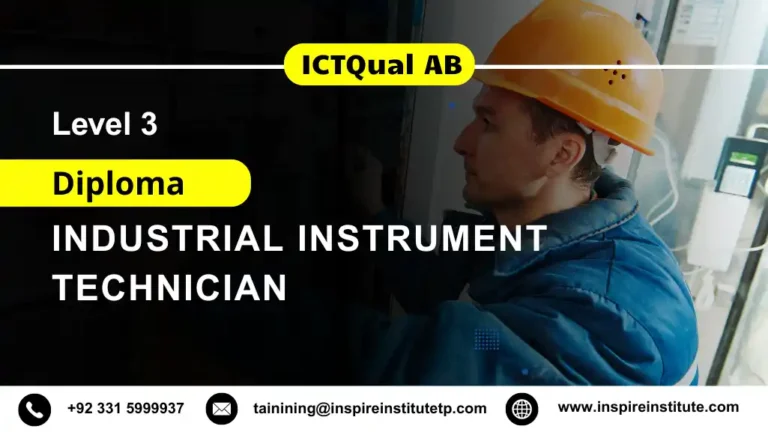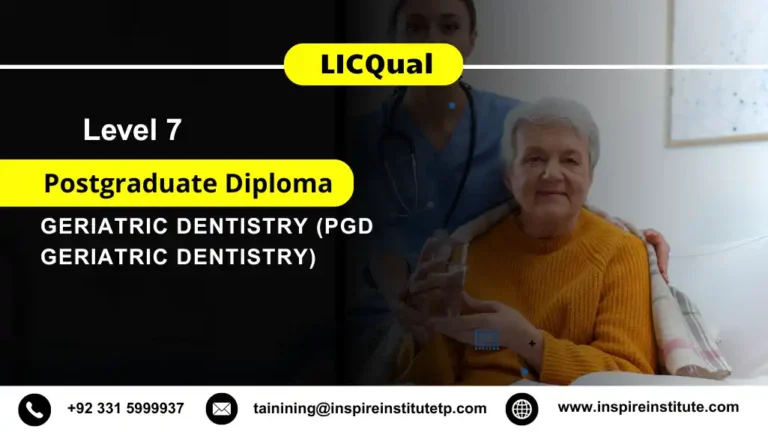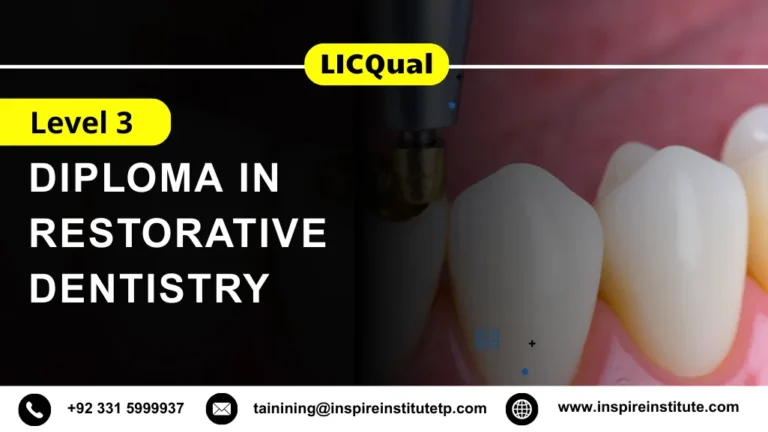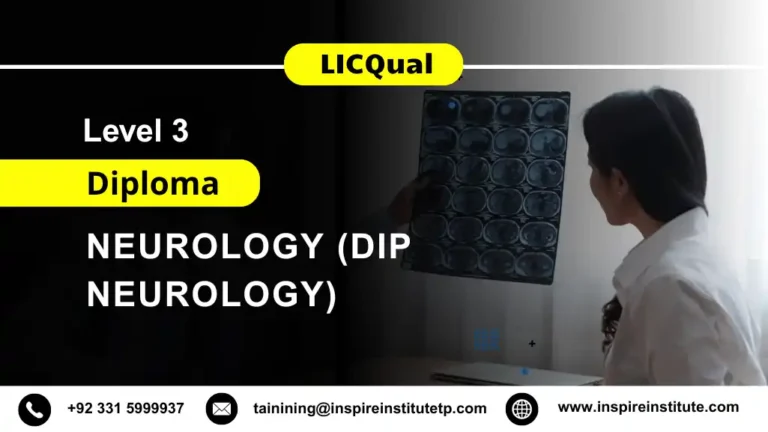LICQual Level 3 Diploma in Cardiothoracic Surgery (Dip CTS)
The LICQual Level 3 Diploma in Cardiothoracic Surgery (Dip CTS) is a UK-accredited qualification designed for healthcare professionals, surgical trainees, nurses, and medical practitioners aiming to specialise in cardiothoracic surgical care. This programme addresses the critical importance of cardiothoracic health, covering complex surgical procedures, cardiovascular and thoracic anatomy, and post-operative patient management. With cardiovascular diseases and thoracic disorders on the rise globally, expertise in cardiothoracic surgery is increasingly essential for delivering high-quality, patient-centred care.
The course provides a comprehensive understanding of the scope of cardiothoracic surgery, including heart and lung operations, minimally invasive procedures, and advanced surgical techniques. Learners gain insights into pre-operative assessment, surgical planning, and post-operative care, ensuring safe and effective outcomes. By integrating theoretical knowledge with practical applications, the programme equips learners to perform confidently in surgical and clinical settings.
Through this assignment-based programme, learners develop specialist skills in patient assessment, surgical instrumentation, monitoring, and post-operative recovery management. The curriculum emphasises evidence-based practice, clinical decision-making, and patient safety protocols. Graduates acquire the expertise to contribute meaningfully to operating theatres, intensive care units, and cardiothoracic wards.
The qualification is internationally recognised, enhancing career opportunities and professional credibility in hospitals, surgical centres, and academic institutions worldwide. It provides a structured pathway for learners to progress in cardiothoracic surgery, cardiovascular nursing, or further surgical training.
Learners also gain critical analytical skills, including interpreting diagnostic tests, assessing surgical risks, and understanding complex pathophysiology. The course fosters clinical reasoning, teamwork, and ethical decision-making, essential for multidisciplinary healthcare environments.
By completing the LICQual Level 3 Diploma in Cardiothoracic Surgery (Dip CTS), healthcare professionals and aspiring surgical practitioners gain the knowledge, skills, and UK-accredited credential necessary to excel in cardiothoracic healthcare. Graduates are empowered to improve patient outcomes, advance surgical care standards, and contribute to innovations in cardiovascular and thoracic medicine.
Why Choose this Qualification
The LICQual Level 3 Diploma in Cardiothoracic Surgery (Dip CTS) is a comprehensive, UK-accredited programme designed for healthcare professionals, surgical trainees, and aspiring cardiothoracic specialists. This qualification provides an in-depth understanding of cardiac and thoracic surgical procedures, patient management, and clinical decision-making, equipping learners with the knowledge and skills necessary to excel in high-pressure surgical environments. By choosing this course, learners gain a recognised credential that enhances professional credibility and opens opportunities for career growth in hospitals, surgical units, and research institutions worldwide.
Key Reasons to Choose this Qualification
Specialist Surgical Knowledge
- Gain an advanced understanding of cardiothoracic anatomy, physiology, and pathology.
- Learn the mechanisms, risk factors, and management of cardiovascular and thoracic diseases.
- Understand pre-operative assessments, surgical planning, and post-operative care protocols.
- Explore minimally invasive and traditional cardiothoracic surgical techniques.
- Develop knowledge to make evidence-based clinical decisions in cardiothoracic settings.
Practical Surgical Application
- Acquire hands-on skills in surgical instrumentation, monitoring, and operative support.
- Learn techniques for patient assessment, surgical preparation, and post-operative care.
- Gain competence in emergency procedures, life support, and intensive care monitoring.
- Apply theory to real-world clinical environments such as operating theatres and surgical wards.
Recognised UK Qualification
- Earn an internationally recognised, UK-accredited diploma in cardiothoracic surgery.
- Enhance professional credibility and employability in hospitals and surgical centres.
- Meet global clinical standards, facilitating career opportunities abroad.
- Validate competence in both theoretical knowledge and practical surgical applications.
Flexible Learning Pathway
- Study at your own pace with an assignment-based structure.
- Balance professional, personal, or academic commitments while progressing in the course.
- Access learning resources and assignments online for convenient study.
- Ideal for working healthcare professionals, surgical trainees, and career changers.
Evidence-Based Surgical Training
- Engage with the latest research, clinical guidelines, and best practices in cardiothoracic surgery.
- Learn to integrate evidence-based techniques into patient care.
- Develop analytical skills to interpret diagnostics and surgical risk assessments.
- Apply current knowledge to ensure safe, effective, and ethical patient management.
Career Advancement
- Open doors to roles such as cardiothoracic surgical assistant, ICU coordinator, or research assistant.
- Gain the foundation for advanced surgical training or postgraduate medical studies.
- Strengthen professional development and specialist expertise in cardiothoracic surgery.
- Improve chances for promotions and leadership positions in surgical departments.
Enhanced Patient Care Delivery
- Provide comprehensive, patient-centred care before, during, and after surgery.
- Learn to educate patients and families on post-operative recovery and lifestyle management.
- Develop skills to manage complex cases, emergencies, and chronic thoracic conditions.
- Contribute to improving patient outcomes and overall healthcare quality.
Professional Growth
- Strengthen clinical reasoning, communication, and teamwork skills.
- Cultivate professionalism, ethics, and accountability in surgical practice.
- Develop decision-making capabilities under high-pressure surgical environments.
- Become a confident, competent, and compassionate cardiothoracic healthcare professional.
By choosing the LICQual Level 3 Diploma in Cardiothoracic Surgery (Dip CTS), learners gain not only a recognised qualification but also the specialist skills, evidence-based knowledge, and practical competence needed to excel in cardiothoracic healthcare. This programme empowers healthcare professionals to advance their careers, improve patient outcomes, and contribute to global surgical excellence.are, advance their careers, and contribute meaningfully to global health outcomes in endocrinology.
Course Overview
LICQual UK Awarding Body
Average Completion Time:
4-12 Months
Study Units: 6 Units
Evidence & Assignment Based
Mandatory Units
Who Should Take This Course
The LICQual Level 3 Diploma in Cardiothoracic Surgery (Dip CTS) is designed for healthcare professionals, surgical trainees, and individuals seeking to specialise in cardiothoracic care. This UK-accredited, assignment-based programme equips learners with advanced knowledge and practical skills in cardiac and thoracic surgery, patient management, and clinical decision-making. It is ideal for those looking to enhance their expertise, career prospects, and clinical competence in hospitals, surgical units, and research environments.
This course is suitable for
Healthcare Professionals
- Nurses, doctors, and surgical assistants aiming to specialise in cardiothoracic care.
- Practitioners seeking to strengthen their understanding of heart and thoracic procedures.
- Professionals looking to enhance patient care through evidence-based surgical knowledge.
- Healthcare staff aiming to advance to senior or specialised surgical roles.
- Those wishing to gain UK-recognised qualifications to boost global career opportunities.
Surgical Trainees
- Trainees preparing for advanced cardiothoracic surgery rotations.
- Individuals seeking structured, assignment-based learning alongside practical training.
- Trainees looking to develop clinical reasoning and operative support skills.
- Learners wanting exposure to both emergency and elective cardiothoracic procedures.
- Candidates aiming to meet professional standards in high-pressure surgical environments.
Allied Health Professionals
- Physiotherapists, occupational therapists, and anaesthesia assistants supporting surgical teams.
- Professionals aiming to understand post-operative care, rehabilitation, and patient monitoring.
- Allied health staff seeking specialised knowledge in cardiac and thoracic patient management.
- Individuals wanting to integrate evidence-based practice into multidisciplinary surgical care.
- Practitioners seeking to expand their professional scope in cardiothoracic units.
Medical Students
- Students interested in pursuing cardiothoracic surgery as a career pathway.
- Learners seeking early exposure to clinical applications and operative procedures.
- Students aiming to supplement theoretical knowledge with practical, assignment-based learning.
- Individuals preparing for postgraduate studies in cardiothoracic or surgical specialties.
- Learners wishing to gain an internationally recognised UK qualification for career advancement.
Career Changers
- Professionals transitioning into surgical or healthcare roles with a focus on cardiothoracic care.
- Individuals with previous healthcare experience seeking specialised surgical training.
- Career changers aiming to gain practical skills and theoretical knowledge in cardiothoracic surgery.
- Learners wanting flexibility through assignment-based study while balancing work commitments.
- Those aiming to expand employability across hospitals, clinics, and surgical centres.
Research and Academic Professionals
- Academics and researchers focusing on cardiothoracic medicine, surgery, and clinical innovation.
- Professionals interested in evidence-based practice and clinical guideline implementation.
- Individuals wanting to integrate research knowledge with practical clinical skills.
- Learners aiming to contribute to surgical research or public health studies.
- Professionals seeking credentials to support teaching or training roles in healthcare.
International Healthcare Professionals
- Nurses, doctors, and surgical assistants aiming to gain UK-recognised qualifications.
- Professionals seeking international career mobility in cardiothoracic surgery.
- Practitioners looking to adopt global best practices and evidence-based care standards.
- Learners wishing to enhance professional credibility in hospitals, research centres, or clinics worldwide.
- Individuals seeking flexible, assignment-based learning compatible with international work schedules.
The LICQual Level 3 Diploma in Cardiothoracic Surgery (Dip CTS) is suitable for a wide range of learners, from healthcare professionals and surgical trainees to medical students and allied health staff. By enrolling, learners gain specialist knowledge, practical skills, and a UK-recognised qualification that strengthens their career prospects, enhances patient care, and equips them for advanced roles in cardiothoracic healthcare.
Course Benefits
The LICQual Level 3 Diploma in Cardiothoracic Surgery (Dip CTS) offers extensive benefits for learners aiming to build expertise in cardiac and thoracic surgical care, heart and lung disease management, and advanced perioperative techniques. By integrating theoretical foundations with evidence-based practical applications, this UK-accredited qualification equips learners to assess, plan, and support surgical interventions effectively. Designed as an assignment-based programme, it provides flexibility, academic excellence, and clinical relevance, supporting professional development for healthcare practitioners, nurses, surgical assistants, and aspiring cardiothoracic specialists.
Key Benefits of the Course:
- Specialist Knowledge:
Gain an in-depth understanding of cardiac and thoracic anatomy, physiology, and the mechanisms underlying conditions such as coronary artery disease, valvular disorders, thoracic malignancies, and congenital heart defects. Learners explore preoperative and postoperative protocols, surgical techniques, and the impact of lifestyle and environmental factors on cardiac and pulmonary health. This knowledge enables graduates to make informed, evidence-based clinical decisions and provide high-quality cardiothoracic care. - Practical Application:
Develop essential clinical skills in perioperative assessment, interpreting diagnostic imaging, supporting surgical procedures, and assisting in patient recovery. Learners gain hands-on experience in patient monitoring, post-surgical care, wound management, and rehabilitation planning. The course ensures graduates can apply theory effectively within cardiac units, thoracic surgery departments, and critical care settings. - Recognised Qualification:
Earn a UK-recognised diploma that validates advanced knowledge and practical skills in cardiothoracic surgery. This internationally recognised qualification enhances professional credibility and career prospects, aligning with global surgical and healthcare standards. Graduates can pursue employment in hospitals, surgical centres, research institutions, and public health organisations worldwide. - Flexible Learning Pathway:
Delivered through an assignment-based format, the programme allows learners to balance professional or personal responsibilities while advancing academically. This flexibility is ideal for surgical nurses, healthcare assistants, medical students, and career changers seeking structured yet accessible training in cardiothoracic surgical practice. - Evidence-Based Training:
The course integrates current research, clinical guidelines, and best practices in cardiac and thoracic surgery. Learners engage with evidence-based approaches to perioperative care, minimally invasive procedures, and postoperative recovery strategies. This ensures graduates adopt safe, effective, and ethical surgical care practices. - Career Development:
This qualification opens diverse career opportunities in hospitals, cardiac centres, thoracic surgery units, and research facilities. Graduates can pursue roles such as surgical care assistant, cardiothoracic support specialist, perioperative coordinator, or progress to advanced studies in surgery, medicine, or clinical research. - Enhanced Patient Care Delivery:
Learners develop the expertise to provide patient-centred cardiothoracic care through accurate assessment, surgical support, and post-surgical monitoring. Graduates are equipped to support recovery, educate patients, and improve overall health outcomes, contributing meaningfully to public health and clinical excellence. - Professional Growth:
The programme strengthens clinical reasoning, communication, and teamwork skills essential for surgical healthcare delivery. Learners cultivate professionalism, ethical awareness, and critical thinking, preparing them to become confident, competent, and compassionate cardiothoracic care practitioners.
The LICQual Level 3 Diploma in Cardiothoracic Surgery (Dip CTS) empowers learners with the knowledge, practical skills, and UK-recognised qualification needed to excel in cardiothoracic healthcare. By combining rigorous academic learning with real-world applications, it prepares healthcare professionals and aspiring practitioners to improve patient outcomes, advance their careers, and contribute to global cardiac and thoracic health initiatives.
Eligibility Criteria
The LICQual Level 3 Diploma in Cardiothoracic Surgery (Dip CTS) is a UK-accredited qualification specifically designed for healthcare professionals, nurses, surgical assistants, and individuals seeking to specialise in cardiothoracic surgery and perioperative care. This assignment-based programme provides a comprehensive understanding of cardiac and thoracic anatomy, surgical techniques, and the clinical management of complex heart and lung conditions. By combining theoretical knowledge with practical application, the course equips learners with the skills to deliver high-quality, evidence-based perioperative and surgical support. Learners who meet the entry requirements will be well-prepared to apply their expertise effectively in hospitals, cardiothoracic surgical units, community health centres, and specialised perioperative care settings.
Educational Background:
Applicants should hold a recognised qualification in healthcare, nursing, medical sciences, or a related discipline. Candidates with Level 2 or Level 3 qualifications in healthcare practice, biology, physiology, or clinical sciences are encouraged to apply. Individuals with equivalent international qualifications will also be considered, provided their credentials meet the academic and professional standards of the programme. The diploma is particularly suitable for learners with an educational background in health sciences, nursing, or allied healthcare who wish to deepen their understanding and competence in cardiothoracic surgical practice.
Professional Experience:
Previous professional experience in surgical care, clinical healthcare, or nursing is beneficial but not mandatory. A minimum of one year’s experience in healthcare or a related field—such as nursing, caregiving, or medical assistance—is recommended. Applicants who have worked in hospitals, surgical wards, or perioperative care settings will find this qualification particularly valuable. Individuals without prior experience but with a strong interest in cardiothoracic surgery are also encouraged to apply, as the course provides comprehensive foundational and practical training to build competence in this specialised field.
Age Requirement:
Learners must be at least 18 years old at the time of enrolment. This requirement ensures that learners possess the maturity, discipline, and professional responsibility necessary for studying cardiothoracic surgery, which involves complex surgical topics, ethical considerations, and patient-centred care. The programme demands commitment, analytical thinking, and clinical reasoning aligned with professional standards for adult healthcare education.
Language Proficiency:
As the LICQual Level 3 Diploma in Cardiothoracic Surgery (Dip CTS) is delivered and assessed in English, learners must demonstrate strong proficiency in reading, writing, and communication. Non-native English speakers are expected to hold an IELTS score of at least 6.0 or an equivalent qualification. This ensures learners can effectively engage with technical course materials, complete assignments, and communicate professionally with patients, surgical teams, and academic mentors. Strong English proficiency also supports accurate documentation and the delivery of safe, patient-centred perioperative care.
Technical Requirements:
Applicants should have access to a personal computer or laptop with a reliable internet connection to participate fully in the online learning process. Basic IT literacy is essential, including familiarity with word processing software, digital research tools, and online learning platforms. Since this qualification is assignment-based, learners submit coursework electronically and engage in self-directed study using digital resources. The flexible online structure enables learners to manage their education alongside professional and personal responsibilities.
Required Documents:
To complete the registration process, applicants must provide a valid passport or national identification card for identity verification, along with proof of educational qualifications such as certificates or academic transcripts. Evidence of relevant professional or healthcare experience should also be submitted where applicable. International candidates may be required to submit certified translations of academic or professional documents to verify authenticity and eligibility. These requirements ensure all learners meet the academic, linguistic, and professional standards necessary for successful enrolment in the programme.
The Qualification Process
LICQual Level 3 Diploma in Cardiothoracic Surgery (Dip CTS) follows a structured pathway to ensure learners gain comprehensive knowledge, practical skills, and professional competence in community oral healthcare.
Step 1: Self-Assessment
Learners review the entry requirements to confirm eligibility. Candidates with a background in dentistry, oral health, or public health are encouraged to apply.
Step 2: Registration
Complete the registration process by submitting required documents such as proof of qualifications, a valid ID, and payment of enrollment fees.
Step 3: Induction
An induction session is conducted to:
- Verify learner eligibility and documentation.
- Introduce study materials, learning outcomes, and assessment procedures.
Step 4: Learning and Evidence Submission
Learners complete assignments, case studies, and practical exercises demonstrating competence in public health dentistry, community oral health assessment, preventive strategies, and program planning.
Step 5: Feedback and Revision
Assessors review submitted evidence and provide constructive feedback. Learners can revise and resubmit work to meet all required standards.
Step 6: Competence Validation
Final submissions are evaluated to confirm that learners have met all theoretical and practical learning outcomes.
Step 7: Internal Quality Assurance (IQA)
The IQA team reviews the assessment process to ensure accuracy, fairness, and compliance with international standards.
Step 8: External Verification (EQA)
External verifiers validate the authenticity and quality of learner achievements.
Step 9: Certification
Upon successful verification, learners are awardedLICQual Level 3 Diploma in Cardiothoracic Surgery (Dip CTS) , demonstrating advanced proficiency in community oral healthcare and preparing them for professional growth in dental public health, preventive dentistry, and healthcare policy.

